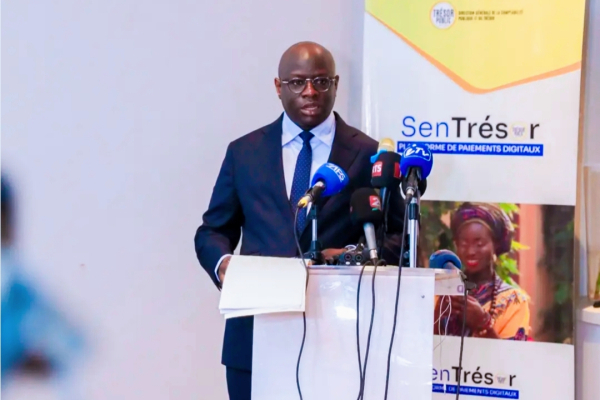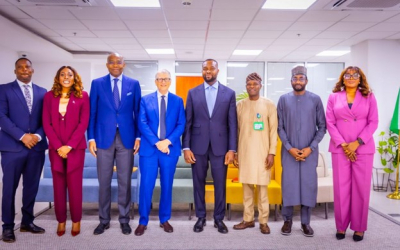In South Africa, this solution relies on digital simplicity to streamline interactions between home service providers and clients.
GoodApp, a digital platform developed by a South African startup, is streamlining the process of booking home services while providing a professional platform for service providers. The Johannesburg-based startup, founded in 2023 and led by Prakhar Srivastava, allows users to book a wide range of services, including cleaning, plumbing, gardening, and electrical work, with just a few clicks.
"In South Africa, millions of talented service providers — electricians, plumbers, cleaners — lack access to consistent demand, digital payments, and formal job platforms. Meanwhile, homeowners and tenants face high friction when trying to find reliable, verified professionals they can trust," Srivastava explains on the reasons behind the app.
GoodApp aims to formalize the service market by centralizing offers, displaying customer reviews, and ensuring quality through provider verification processes. The app is available on both iOS and Android, and according to Play Store data, it has already been downloaded over 5,000 times.
Currently, the startup primarily operates in Johannesburg and Cape Town. GoodApp is planning its first international expansion with a pilot project in the United States by the end of the year. In a growing gig economy where digital habits are becoming increasingly integrated into daily life, GoodApp exemplifies a new wave of African innovation focused on economic inclusion and user experience.
By Adoni Conrad Quenum,
Editing by Feriol Bewa
Since launching its digital strategy, Senegal has ramped up initiatives to modernize its public administration, boost transparency, and bring government services closer to citizens through digital tools.
Senegal's Minister of Finance and Budget, Cheikh Diba (photo), officially launched SenTrésor, a new digital platform for public payments, on Monday, June 2, in Dakar. The project, developed by the General Directorate of Public Accounting and the Treasury, aims to modernize and streamline financial transactions between the state and its citizens.
According to Diba, "beyond the simple digitization of payments, SenTrésor marks the beginning of a new model of interaction between the state and its citizens, based on simplified administrative procedures. SenTrésor addresses the challenge of mass payments, which require large personnel deployments and generate numerous constraints."
The platform centralizes public payments, including salaries, social assistance, scholarships, and emergency relief, through mobile money services. A network of "investigators" deployed nationwide, particularly in rural areas, identifies beneficiaries, collects data, verifies eligibility, and registers them in a secure database. Payments are then made automatically, eliminating the need for beneficiaries to travel.
Since its pilot phase began on March 28, 2025, SenTrésor has served over 44,000 people, with total disbursements exceeding 4 billion CFA francs (approximately $6.9 million). The platform has demonstrated high reliability and traceability.
The launch of SenTrésor aligns with Senegal’s broader push to digitize public services, consistent with the country's Vision 2050 and its New Technological Deal. It complements other recent government-led digital initiatives such as e-solde, Tabax, and Jubbanti. All these efforts are designed to boost administrative efficiency, improve access to public services, and accelerate digital inclusion.
By enabling direct payments from the state to citizens, SenTrésor is expected to help lower administrative costs, combat fraud, and promote financial inclusion, especially for those excluded from traditional banking networks.
However, several challenges could hinder the platform’s widespread adoption. These include limited access to mobile internet, uneven network coverage in rural areas, the digital divide, and public trust in the security of government digital platforms. As of early 2025, an estimated 11.3 million people in Senegal were using the internet, representing an online penetration rate of 60.6%.
To address these challenges, authorities will need to support SenTrésor’s rollout with awareness campaigns, partnerships with mobile network operators, and the strengthening of digital infrastructure in the most remote areas.
By Samira Njoya,
Editing by Sèna D. B. de Sodji
Applications are now open for Pitch2Win 5, a startup competition offering $10,000 in equity-free funding to the top early-stage startup building for the African market.
The competition targets tech-driven startups with a working product or MVP and coverage in Nigeria. Startups from all sectors are eligible.
Finalists will pitch live to a panel of investors and ecosystem leaders. To apply, startups must submit an online form and a 10-slide pitch deck. Applications close June 15, 2025.
Nigeria is set to host its first National Cybersecurity Conference, marking a major step forward in the country’s efforts to strengthen its digital defense infrastructure.
The event is being organized in collaboration with the Office of the National Security Adviser (ONSA) and key partners from both the public and private sectors.
Scheduled for July 9–10, 2025, at the Abuja Continental Hotel, the conference will bring together policymakers, cybersecurity experts, international partners, tech industry leaders, and strategic stakeholders from Nigeria, across Africa, and globally. It aims to foster collaboration, build national cyber capacity, and strengthen Nigeria’s readiness to tackle emerging threats in cyberspace.
dLocal, a global cross-border payments provider, has announced its intent to acquire AZA Finance, a fintech company specializing in African foreign exchange and cross-border payments. The deal, subject to regulatory approval, aims to boost dLocal’s scale and capabilities across the continent.
The acquisition will expand dLocal’s African footprint, increase cross-border volumes, and enhance remittance services. AZA’s experienced team will bring local market expertise to dLocal’s operations.
By combining global infrastructure with regional expertise, dLocal and AZA aim to simplify and scale cross-border payments across one of the world’s most complex and opportunity-rich markets.
As artificial intelligence reshapes global economies and systems, the Nigeria AI Scaling Hub positions the country as a continental leader in responsible AI innovation.
The Federal Ministry of Communications, Innovation & Digital Economy, in collaboration with the Gates Foundation, has officially launched the Nigeria Artificial Intelligence (AI) Scaling Hub. The initiative, announced on June 3, is designed to accelerate the responsible development and deployment of AI solutions that help improve lives across critical sectors, such as health, agriculture, and education.
“The AI Scaling Hub will serve as a catalyst for Nigerian innovators — providing the resources, mentorship, and support necessary to translate ideas into impact,” said Dr. ‘Bosun Tijani, Minister of Communications, Innovation & Digital Economy. “By working with the Gates Foundation, we are strengthening our capacity to ensure that AI-driven solutions are developed responsibly and deployed equitably.”
The announcement was made during the Memorandum of Understanding (MOU) signing ceremony between the Ministry and the Gates Foundation, held in Abuja. With a $7.5 million commitment over three years from the Gates Foundation, the AI Scaling Hub aims to become a national engine for deploying mature AI solutions that deliver measurable impact at scale.
The Nigeria AI Scaling Hub is a multi-stakeholder platform that brings together government bodies, private sector technology firms, academic institutions, and development partners. It will play a central role in identifying scalable, homegrown AI innovations and coordinating their implementation across Nigeria’s public and private sectors.
“AI is transforming how we address development challenges — unlocking new ways to improve lives and strengthen systems,” said Uche Amaonwu, Nigeria Country Director at the Gates Foundation. “We’re proud to support the Nigeria AI Scaling Hub with the Government of Nigeria and Lagos Business School, investing in local talent and innovation to ensure the benefits of AI reach those who need them most.”
The initiative builds on the government’s recent progress in AI adoption, including the drafting of a National AI Strategy, which outlines Nigeria’s commitment to deploying AI responsibly and ethically. The strategy is designed to guide the country’s use of emerging technologies in a way that promotes inclusion, safeguards rights, and supports long-term development.
The launch also arrives at a critical moment when global tech leaders are intensifying their focus on AI capacity-building in Nigeria. Earlier, in February, Microsoft announced a $1 million investment to train one million Nigerians in AI over the next two years. Taken together, these developments signal a converging momentum around AI as both an innovation platform and an economic imperative for the country. The combination of skilling and scaling means Nigeria is no longer just preparing for AI—it is actively shaping how AI will be used for development, inclusion, and economic growth.
Hikmatu Bilali
With the rise of e-commerce in Africa, efficient logistics have become crucial. In Egypt, three tech entrepreneurs have developed a customized solution specifically for small and medium-sized businesses.
Turuq, a digital solution developed by an Egyptian startup, offers tailored last-mile delivery services. It aims to simplify logistics for small and medium-sized enterprises. Founded in 2023 by Ahmed Atta, Karim Kamal, and Ahmed Alaa, the platform seeks to handle the complexities of delivery, allowing businesses to focus on their core operations.
"From the warehouse to the doorstep, we handle the logistics so our clients can focus on what they do best: designing and selling great products," said Ahmed Atta, one of the co-founders.
While a dedicated mobile application is currently in development and expected in the coming months, users can access Turuq's services via a web browser. The platform combines full automation, end-to-end transparency, and operational efficiency to provide clients complete control over their delivery process, aiming to eliminate traditional logistics challenges.
Unlike some service providers that operate without technological infrastructure, Turuq has built an integrated platform that offers real-time updates, automated issue resolution, and complete visibility for both brands and end consumers. This digital approach is designed to prevent common misunderstandings between couriers and customers, thereby enhancing the overall delivery experience.
Turuq has reported a 94% customer retention rate and a 76% successful delivery rate even in complex urban environments. The startup operates on a pay-per-delivery pricing structure, with optional premium services, generating steady revenue while reducing delivery costs as its operations scale.
Adoni Conrad Quenum
After completing his studies, he settled in Gabon to develop technological solutions tailored to local needs. His work aims to improve access to electricity services through digital tools.
Birane Ndiaye, a communications expert and tech entrepreneur based in Gabon, is the founder and CEO of Orema Technology, a startup launched in 2018 specializing in connected solutions for the energy industry. The company develops tools based on the Internet of Things (IoT) to modernize the management of prepaid electricity meters, particularly those of Gabon's national energy and water company, Société d’Énergie et d’Eau du Gabon (SEEG), marketed under the EDAN brand.
Orema Technology designed a smart device linked to a mobile application, enabling users to check their consumption, recharge credit, and monitor usage in real time, all remotely via a smartphone.
"Buying EDAN credit and recharging your account during the rainy season, when it's crucial, really made us think," Ndiaye explained, recalling the project's origin in 2019. "Since all EDAN meters are installed outside the premises, we figured we had to find a solution that worked for everyone. Digital technology was the key to our problem."
Ndiaye holds a degree in public relations, advertising, and applied communication from the University of Johannesburg in South Africa. Before his entrepreneurial ventures, he served as CEO of the Société équatoriale des Mines (SEM) in Gabon between 2016 and 2017.
By Melchior Koba,
Editing by Sèna D. B. de Sodji
Growing up in the Democratic Republic of Congo, a country frequently impacted by humanitarian and climate crises, solidified his dedication to often-marginalized rural communities.
Joseph Tsongo is a Congolese entrepreneur dedicated to social and environmental causes, a commitment rooted in his upbringing in the Democratic Republic of Congo, a country frequently impacted by humanitarian and climate crises.
He is the founder and CEO of Jambo Lab, a tech startup launched in 2022. The company focuses on protecting vulnerable communities from the effects of climate change. Jambo Lab developed a web platform, also named Jambo Lab, that uses artificial intelligence and an SMS alert system. The platform aims to strengthen the adaptation of rural populations in the DRC by providing practical information on sustainable farming techniques.
Accessible even without a smartphone or internet connection, the platform allows residents, including Indigenous peoples and those displaced by war in the eastern part of the country, to interact and exchange information using basic mobile phones.
In parallel, Tsongo co-founded Jambo Radio in 2022, a mobile community media outlet where he serves as a storyteller. This media produces and broadcasts programs in local languages, combining online podcasts with group listening sessions followed by debates within listener clubs. The goal is to raise awareness of climate and environmental issues, combat disinformation, and promote fact-based local advocacy.
Tsongo's civic engagement predates these initiatives. In 2016, he established Amani-Institute ASBL, a youth movement with a socio-cultural mission focused on peacebuilding in eastern DRC. From 2014 to 2021, he also managed a community radio station that highlighted environmental issues within the Virunga Landscape.
By Melchior Koba,
Editing by Sèna D. B. de Sodji
While a few African countries have already launched 5G, Egypt is now preparing to deploy this technology. The support of international donors reflects the strategic stakes of this transition toward faster and more reliable connectivity.
The European Bank for Reconstruction and Development (EBRD) announced on Wednesday, May 28, a syndicated loan of $85 million to telecom operator Orange Egypt, in partnership with Banque Misr.
The financing aims to support Orange Egypt's acquisition of a 5G mobile license from the National Telecommunications Regulatory Authority and to fund the nationwide deployment of next-generation telecom infrastructure.
The loan is structured with a $44.5 million contribution from the EBRD and $40 million mobilized by Banque Misr’s Dubai branch.
"We are proud to partner with Banque Misr and the EBRD in a move that underscores international confidence in Egypt’s economy and supports our vision for advancing the telecommunications sector" said Mohamed Sayed, Chief Financial Officer of Orange Egypt. "Through technologies such as 5G, we aim to enhance services in education, healthcare and smart cities, bridging the digital divide and driving Egypt’s digital economy forward."
This project aligns with the "Digital Egypt 2030" strategy, spearheaded by the Egyptian government. In January 2024, the National Telecommunications Regulatory Authority awarded 5G licenses to several operators, including Orange Egypt, Vodafone Egypt, and e& Egypt, for a total of $675 million. These licenses also cover the renewal of previous generation authorizations for a 15-year period, without the addition of new frequency bands.
With the backing of the EBRD and Banque Misr, Orange Egypt plans to accelerate its 5G rollout and modernize its network. The technology is expected to significantly enhance users' digital experience through higher speeds, lower latency, and more reliable connections. It also paves the way for innovative services in key sectors, fostering an inclusive digital transition and contributing to a reduction of over 1.74 million tons of carbon dioxide emissions annually, in line with Egypt’s climate commitments.
The initiative comes amid robust demand for high-speed connectivity in Egypt. According to the Ministry of Information and Communication Technology, the country had 83.07 million internet users in July 2024, an 8.46% annual increase from 76.59 million a year earlier. Fixed internet subscribers reached 11.23 million, within an estimated total population of 112.71 million.
By Samira Njoya,
Editing by Sèna D. B. de Sodji
More...
Tech startups are at the heart of Morocco’s innovation strategy. By connecting them to global markets, the country aims to establish itself as a digital hub in Africa.
Technopark Maroc, a business incubator for technology companies, and Plug and Play, a global innovation platform, signed a partnership agreement on Monday in Casablanca to launch an acceleration program for Moroccan startups.
The agreement was signed in the presence of Amal El Fallah Seghrouchni, Minister Delegate in charge of Digital Transition and Administrative Reform, and has the strategic support of the Ministry of Economy and Finance.
Under the partnership, an accelerator will be established within Technopark Casablanca to support more than 60 high-potential Moroccan startups over two years. The program will offer an intensive three-month curriculum focused on skills development, access to funding, connections to international markets, and preparation for scaling abroad.
This initiative aligns with Morocco’s digital strategy, Morocco Digital 2030, which aims to create 3,000 start-ups by 2030, including 1,000 by 2026, and to raise 7 billion dirhams ($761 million) in funding. The strategy depends on a dynamic ecosystem and strengthened public-private partnerships.
According to the Partech 2024 report, Morocco ranks sixth in Africa for tech fundraising, raising $82 million, which represents 75% of tech financing in North Africa and 36% in Francophone Africa. The Plug and Play program seeks to build on this momentum by encouraging investment, fostering local innovation, and integrating start-ups into global technology networks.
By hosting a world-renowned accelerator at the heart of Technopark, the project aims to structure support for young innovative companies, attract foreign investment, and enhance Morocco’s appeal as a hub for tech talent.
Plug and Play operates in more than 60 countries and will provide Moroccan start-ups access to a global network of over 550 corporate and technology partners, reinforcing Morocco’s ambition to become a leading innovation player on the African continent.
By Samira Njoya,
Editing by Sèna D. B. de Sodji
For several years, he has been developing concrete solutions for young Ugandans. Through his initiatives, he works directly in the field to strengthen digital skills and encourage entrepreneurship.
Keneth Twesigye, a Ugandan computer scientist and ardent advocate for entrepreneurship, is the founder and head of TechBuzz Hub, a startup incubator launched in 2016 with the mission of helping young entrepreneurs transform their project ideas into viable ventures.
Based in Uganda, TechBuzz Hub is a collaborative ecosystem that draws on experts across diverse fields including technology, business, social sciences, and creative arts. The incubator provides comprehensive training and support programs, offering its participants unlimited access to crucial resources such as mentorship, professional development training, coworking spaces, and advisory services.
Beyond direct incubation, TechBuzz Hub also organizes networking events designed to foster interaction among entrepreneurs, startups, and established business leaders. These gatherings facilitate synergy, knowledge sharing, and project monitoring, all under the guidance of experienced professionals.
In addition to his leadership at TechBuzz Hub, Twesigye plays a significant role in broader national initiatives. He oversees public policy at Startup Uganda, a key network connecting innovation stakeholders and organizations that support entrepreneurship. Demonstrating his commitment to public service, he also volunteers as a policy analyst at the Ugandan Ministry of Trade, Industry, and Cooperatives.
Twesigye earned his bachelor's degree in computer science from Uganda Technology and Management University in 2016. His expertise has also been sought internationally; in 2022, he collaborated with the United Nations Capital Development Fund (UNCDF) as a Google digital skills trainer. That same year, he contributed as a business development facilitator for AfriLabs, a pan-African network dedicated to supporting incubators and accelerators across the continent.
Melchior Koba
Last week, the Nigerian fintech successfully raised $4.2 million in a funding round. It plans to use the funds to accelerate its growth in Africa and develop its technology.
Carrot Credit, a Nigerian fintech startup founded in 2023 by Boluwatife Aiki-Raji, is enabling individuals and businesses to secure online loans using their digital investments as collateral. The platform offers a novel solution for those holding financial assets who might otherwise struggle to obtain traditional credit.
Carrot Credit allows users to borrow up to 40% of the value of their equity investments, including non-fungible tokens (NFTs) and cryptocurrencies, or up to 70% of their fixed-income assets, such as government bonds. This approach allows borrowers to access liquidity without having to sell their underlying investments.
The startup secures these loans by placing a lien on the digital assets through API integrations. This ensures that while Carrot Credit holds a claim, borrowers retain ownership of their investments. The repayment terms are flexible, offering fixed durations of 3, 6, or 12 months, or adjustable monthly payment options.
Carrot Credit's interest rates are designed to be competitive, providing an appealing alternative to existing credit options in the Nigerian market. The company operates on an integrated business-to-business-to-customer (B2B2C) model, forging partnerships with fintech platforms, brokers, and digital wealth managers across Africa. This strategy aims to broaden credit access and embed Carrot Credit's services directly into the financial routines of digitally-savvy consumers.
The fintech firm reports disbursing over $2 million in loans to more than 10,000 users so far. With its innovative model, Carrot Credit seeks to make credit more inclusive and better aligned with the digital investment habits of a new generation of African consumers.
"Access to credit shouldn’t be limited by geography or legacy infrastructure," said Boluwatife Aiki-Raji. "People in Nigeria and across Africa are already investing in digital assets –but there’s no ecosystem to help them unlock liquidity when it matters. Carrot is building that bridge, helping users leverage their investments and take cash out when they need liquidity the most."
By Adoni Conrad Quenum,
Editing by Feriol Bewa
Through several concrete projects, he leverages his technical skills to address the financial and health challenges faced by Africans, both on the continent and within the diaspora.
Oluwatomisin Kolawole (photo) is a Nigerian tech entrepreneur with an atypical background. A trained veterinary doctor, he is also a biomedical engineer and currently heads Reeple, a U.S.-based financial technology start-up he co-founded in 2022.
The startup offers cross-border payment solutions for Africans in the diaspora and freelancers around the world. It facilitates the transfer of funds to Nigeria from Europe, Canada, and the United States, while enabling users to receive international payments through the opening of bank accounts in the United States and Canada.
Reeple specifically targets freelancers, offering them simplified access to international banking services to receive payments from their clients, wherever they are in the world.
In parallel, Oluwatomisin Kolawole runs Vinsighte Limited, a digital health company founded in 2018. Using artificial intelligence, it improves the daily lives of blind or visually impaired people in Africa, providing them with greater autonomy and a better quality of life.
The entrepreneur holds a degree in biomedical engineering from the University of Lagos in Nigeria. He also has a doctorate in veterinary medicine from the University of Ibadan. His professional career began in 2012 at Texan Medical, a company specializing in the distribution of hospital equipment, where he worked as a biomedical engineer and marketing specialist.
In 2015, he joined Tomkol-Jahchen Organization, a social structure dedicated to training and mentoring youth, as director. At the same time, he worked as general secretary at Enactus, an organization that invests in student entrepreneurs. Three years later, he became brand manager at Unibadan Entrepreneur Network, an organization that identifies, connects, and trains young entrepreneurs from the University of Ibadan.
By Melchior Koba,
Editing by Sèna D. B. de Sodji















